- It is normal to experience a mild aching in your teeth. If you experience excessive pain contact the practice for advice.
- During treatment one or two teeth may feel bruised to bite on or feel like they are in the way of your bite.
- Gaps in your teeth may increase as teeth as moved into their new positions, this is nothing to be concerned about all the gaps will be closed as the teeth are aligned.
- If any of the square brackets which are stuck to each individual tooth slide or spin on the wire the brace has broken, you will need to telephone the practice to get it repaired.
- If any metal parts of the brace rub you can cover these with wax until your lips and cheeks toughen up. Wax can be bought at any orthodontic practice.
- Occasionally the wires may twist and rub cheeks. This will need correcting by your orthodontist as wax will only offer a temporary relief for it. If anything suddenly feels sharp or like it is ‘sticking in’ contact the reception staff for an appointment.
- Delaying repairs can add weeks to the duration of your treatment.
- We will work hard to align your teeth but your perfect smile also depends on good oral hygiene! An effective tooth brushing regime is essential throughout treatment to avoid the white ‘chalky stains’ known as decalcification. This is irreversible but easily avoided by ensuring time is taken to remove all plaque using the specific oral hygiene products recommended by your orthodontist. Visit http://beta.stmichaelsorthodontics.co.uk/6-essential-steps-for-good-oral-hygiene-2/ for more advice.
- Adjustments to your diet will be necessary during treatment. Sugary foods and drinks should be avoided; this includes ‘low sugar’ varieties of drinks! Sticky and hard foods can damage the brace; this will mean added appointment time and possible delays to the progress of your treatment.
- During treatment it is essential to continue regular check-ups with your dentist and inform us if you change practices.
6 ESSENTIAL STEPS FOR GOOD ORAL HYGIENE
So your on your way to a new smile! Follow these 6 essential steps to ensure that you maintain excellent oral hygiene. Plaque left on tooth surfaces can cause irreversible damage called decalcification. These white ‘chalky marks’ are not caused by the brace but by ineffective tooth brushing during treatment.
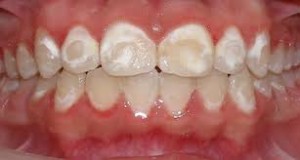
BRUSHING
- 3-4 times a day – Tooth brushing is very important! Brush on a morning, an evening (before bed) and after every meal. This means you will have to clean your teeth during school/work hours. Make sure you brush all your tooth surfaces and get in and around the brackets efficiently. Don’t forget to brush your gums!
- Brush for at least 2 minutes each time
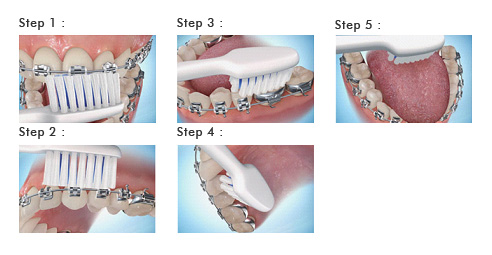
TOOTHBRUSHES
- There are two types of brushes you will need to clean your teeth thoroughly. The first is and orthodontic toothbrush – It has a ‘V’ shape, designed to go around the brackets. The second one is called an interdental brush
- This is essential to clean between the brackets and under the wire
- The places your toothbrush can’t reach.
- Replace your toothbrush every 3-4 months to ensure your teeth are getting the best clean.

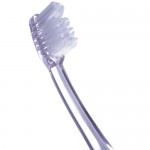
TOOTHPASTE
- Use fluoride toothpaste, it doesn’t matter which one as long as it contains fluoride. Use a pea sized amount on your toothbrush.
MOUTHWASH
- A fluoride mouthwash is recommended to keep the enamel of the teeth strong when the fixed appliance is in place. This should be used every night at a different time to brushing.
- Hold it in the mouth for a fill minute and ‘swish’ around for it to reach all areas of your mouth.
- This is NOT a substitute for tooth brushing!
FLOSSING
- It might seem like you can’t floss whilst your braces are on, but you can. You can get special flossing products for when you’re wearing your orthodontic appliance
- These include interdental brushes and floss threaders. You can do this at least once a day.
DISCLOSING TABLETS
- If you or your orthodontist feels like you aren’t brushing your teeth correctly these are perfect for showing you the places that you have missed.
- Simply chew the tablet and ‘swish’ it round your mouth for a few seconds and it will colour the areas of your teeth and gums that you have missed. You can then brush away the areas that you haven’t reached. Do this a 1-2 times a week to keep you on top of your brushing and keep your teeth and gums healthy.
- Remember to put Vaseline on your lips to avoid dying your lips a bright colour!
By following these 6 simple rules you can ensure a wonderful new smile.
Invisalign or fixed braces?
Here we give you the pros and cons of both Invisalign braces and fixed braces.
INVISALIGN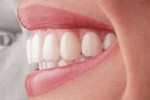
- BPA-free almost invisible aligners so you can still feel at ease in social situations
- No wires or brackets to rub
- Removable
- No problems with any food getting caught
- No foods off limits
- No changes are needed to maintain good oral health as the aligners are removed
- Virtual 3D treatment can estimate length of treatment more accurately
- Less risk of enamel decalcification cause by poor oral hygiene and brackets
CONS
- Can initially affect speech
- The aligners can be lost which has a cost implication
FIXED BRACES

- Better at treating more complex tooth movements
- Cannot be removed so less self discipline is required
- More types of brace available to suit your needs
- The final tooth position is more precise with fixed braces
CONS
- The wires and brackets can rub and cause discomfort
- Some hard, sticky foods are off limits
- Some foods can cause discolouration
- Cleaning the teeth and brace requires more time and specially designed brushes
The decision to improve your smile is not one to be taken lightly; the expert team at St Michaels Orthodontics can guide you through the process. Call and arrange your free assessment with our Treatment Coordinator on 01924380680 or contact Dawn on orthodontictc@gmail.com. You can also visit http://beta.stmichaelsorthodontics.co.uk/private/ for more information.
Whatever your decision you won’t regret it!The truth about tooth whitening


What is tooth whitening?
Tooth whitening is a procedure performed by Dentists to improve the colour of your teeth. It involves a tooth whitening gel either Carbamide Peroxide or Hydrogen Peroxide that you place into some custom made trays that you wear over night to lighten your teeth. The active whitening ingredient (Carbamide or Hydrogen Peroxide) penetrates your enamel to get to the discoloured molecules and over a period of 4-5 days you will notice a huge difference in the colour of your teeth. It is the perfect way to finish off your smile after orthodontic treatment!
Frequently asked questions
1. My hairdresser does tooth whitening in her salon is it ok to go there?
The answer is no. Only registered Dentists, Dental Therapists, Dental Hygienists and Clinical Dental Technicians working to the prescription of a dentist can perform tooth whitening. The British Association of Beauty Therapy and Cosmetology (BABTC) state that they will not insure any individual to perform tooth whitening. First of all they will not have insurance and secondly they will not have the correct equipment and training.
2. Is it illegal for beauticians to offer tooth whitening?
Yes. The High Court case of GDC Jamous confirmed that tooth whitening is the practice of dentistry and can only be legally performed by a dentist or a dental therapist, dental hygienist or a clinical dental technician working to the prescription of a dentist.
3. Can I book my son in for tooth whitening treatment for his 16th birthday?
No. Under the Cosmetic Products (Safety) regulations 2012 every patient must be over the age of 18 weather they are accompanied by an adult or not.
4. I want my teeth really white! I’ve seen some high percentage tooth whitening gels online will they be ok to use?
No. Firstly as stated before, only registered Dentists, Dental Therapists, Dental Hygienists and Clinical Dental Technicians working to the prescription of a dentist can perform tooth whitening. Regulations allow the maximum use of 6% Hydrogen Peroxide present or released. 10% of Carbamide Peroxide would release a maximum of 3.6% Hydrogen Peroxide therefore 16% Carbamide Peroxide is used in Dental Practices as the maximum Hydrogen Peroxide it will release is under 6%.
For more information on tooth whitening and what St Michaels Orthodontics have to offer – http://beta.stmichaelsorthodontics.co.uk/tooth-whitening/
10 top reasons to smile

- 1. Smiling makes us attractive There is a huge attraction factor to those who smile, we are drawn to them! Frowns and unhappy people push people away, so keep smiling.
- 2. Smiling relieves stress When we are stressed it really shows up in our faces. Smiling can help us! When you’re stressed try your best to keep smiling and you will defiantly see a change in how you feel. It prevents you from looking tired, run down or upset. It makes other people think you are happy and you will feel a lot happier in yourself.
- 3. Smiling changes our mood Next time you are feeling down, try putting on a smile. There’s a good chance you mood will change for the better. Smiling can trick the body into helping you change your mood.
- 4. Smiling is contagious When someone is smiling; straight away they lighten up the room and make things more positive. If someone is smiling and seems a really happy person, it will make you want to smile as well. It changes the moods of others as a smiling person brings happiness with them. Make sure you smile lots and you will draw people too you!
- 5. Smiling boosts your immune system When you smile you are more relaxed so your immune function can improve. Smile and you could prevent certain virus like cold and flu.
- 6. Smiling lowers your blood pressure See if you notice a difference? Sit down at home and take a reading of your blood pressure. Spend the day smiling and measure your blood pressure after. You should see a reduction in your blood pressure, give it a try!
- 7. Smiling releases endorphins, natural pain killers and serotonin Smiling is a natural drug, it releases endorphins, natural pain killers and serotonin and together these make us feel a lot better in our selves.
- 8. Smiling lifts the face and makes you look younger No one needs to go for the expense of a face lift, just smile! Smiling will use muscles to lift your face and make you feel and look younger.
- 9. Smiling makes you seem successful Smiling people appear more confident, are more likely to be promoted, and more likely to be approached. Put on a smile at meetings and appointments and people will react to you differently.
- 10. Smiling helps you stay positive Try this test: Smile. Now try to think of something negative without losing the smile. It’s hard. When we smile our body is sending the rest of us a message that “Life is good!” Stay away from depression, stress and worry by smiling.
National Smile Month – Local schools brush up on their knowledge on the importance of good oral hygiene!
Here at St Michaels Orthodontics we think it is very important for everyone to have a good understanding on how important good oral health is, especially young children! We feel if children learn young then hopefully in the future there will be a lower percentage of adults with dental problems. Two members of staff here at St Michaels, Katie and Kate, make regular visits to local schools and present a talk on oral hygiene, braces and ourselves at St Michaels Orthodontics. Recently they have visited 3 different classes, one at Flushdyke Junior and Infant School and two at Towngate School. They came back with such great feedback on how much the children and teachers learnt from the talk! They were amazed how much they learnt, two minutes of brushing is actually a very long time! Also who’d of thought flavored water contained so much sugar? The children and teachers won’t be drinking that as much anymore! The children loved getting involved and learning about how the brush their teeth properly, what to use, what’s good and what’s bad for your teeth and the consequences if good oral hygiene doesn’t take place.



There are so many ways of getting yourself, your team and your friends involved. Why not select a few people and do a sponsored leg wax or create an eye catching display full of posters and information. Why not do a smileathron? Here at St Michaels Orthodontics we love taking as many pictures (selfies) as we can with the national smile month smilies. It’s a fun and easy way of taking part. You could even get your hands dirty and get all creative baking some tasty little treats to sell and raise money. Last year the staff at St Michaels did a full week of baking and raised a great amount of money for this event. Our therapist Katie and her nurse Kate also set up a cart at our local shopping centre handing out leaflets, toothpaste samples, balloons and pens as well as stopping shoppers walking past and having a quick chat about the importance of good Oral Health. There’s so much to do so there’s no excuse to not take part!

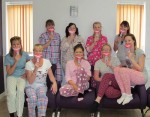
 Continue reading
Continue reading Top Tips on how to keep your smile nice!
Throughout your life it is very important to keep your teeth! Teeth are necessary for chewing (mastication), this is where the teeth grind, tear and cut food ready for swallowing. Without your teeth, chewing will become very difficult, so make sure you keep your teeth as long as you possibly can!
Oral Hygiene
One very important thing that should be part of your daily routine is cleaning and flossing your teeth. This will help maintain your healthy smile.
Brushing tips
-First of all, choose a medium bristle brush or an electric brush and a toothpaste containing fluoride. (Fluoride has been proven to prevent cavities).
-Brush after every meal (3-4 times daily). One of those times should be just before you go to sleep on a night. Brushing too hard can damage your gums causing recession.
–Brush your teeth for a minimum time of two minutes each time. A top tip is to brush whilst listening to a song and by the time the song has finished, you’ll have done your two minutes of brushing.
–Roll or flick the brush so that the bristles move out from under the gum toward the biting edge of the tooth. This helps move the plaque out from under the gum line.
-Use interdental brushes twice daily to remove debris from in between your teeth.
-Use a fluoride mouthwash once a day on a separate occasion to brushing.
Bad oral hygiene will result in decalcification!!
The diagram below shows decalcification!
Decalcification simply means loss of calcium from the teeth. It occurs with poor cleaning and a bad diet leaving plaque to sit and built up on the teeth. This allows the acid in the plaque to sit on the enamel, resulting in the calcium being drawn out of each tooth. The calcium makes the enamel strong and with out it, it will become soft. This is irriversable as it is the early stages of decay.

Good diet?
A good diet is very important to help keep your teeth healthy. A poor diet can lead to gum disease, tooth decay and bad breath (halitosis). Try avoiding acidic food and drinks as each time you eat or drink, your teeth are under attack for up to one hour! Sugar reacts with bacteria in plaque and will cause harmful acids that will attack your teeth and may result in decay or decalcification. Therefore you need to make sure you have a balanced diet.
Acidic food and drinks causes damage to your teeth (decay/decalcification). Acid wears away enamel on your teeth and leaves dentine uncovered, your teeth are then more prone to decay. Tooth decay can lead to fillings in your teeth or even extractions (removal of teeth).
Any food or drink with a PH level lower than 5.5 is a danger as it has a potential of causing damage to your teeth. Here are some examples:
Examples to avoid are:
- Vinegar PH 2.0
- Red wine PH 2.5
- Cola PH 2.5
- Pickles PH 3.2
- Grapefruit PH 3.3
- Orange juice PH 3.8
- Lager PH 4.4
Examples of healthier snacks are:
- Cheddar Cheese PH 5.9
- Celery PH 6.5
- Milk PH 6.9
- Breadstick PH 7.0
- Mineral Water PH 7.6
- Walnut PH 8.0
- Carrots PH 9.5
The best drink to have throughout the day is water or milk and to drink as little red wine and fruit juices as possible as they have a much higher risk of causing damage to your teeth. Try to drink fruit juices or anything very acidic at meal times to minimise the acid attacks on your teeth throughout the day.
World Radiography Day
Radiographers worldwide can celebrate the discovery of x-radiation by Wilhelm Roentgen in 1895. World radiography day is celebrated on the 8Th of November every year, its 24 hours in the year that is dedicated to celebrating the work done by all radiographers round the world. It is a chance to increase public awareness of diagnostic imaging and radiation therapy.
The international day of radiography 2012 marked the 117th anniversary of Wilhelm’s discovery of x-rays. Many events took place all over the world to celebrate this day. In the UK, the Royal College of Radiologists organised a free public lecture by Dr. Phil O’Connor. Dr O’Conner served as head of musculoskeletal imaging at the London Olympics in 2012.
The European Society of Radiography has published two booklets dedicated to this important day. ‘The story of radiology’ which is all about the history of radiology and ‘Making cancer visible’.
The international society of Radiographers and Radiological Technologists would like to encourage all radiographers over the world to celebrate this great discovery. So get celebrating!
Denplan and British Dental Health Foundation launch Blue Lip Selfie campaign in aid of Mouth Cancer
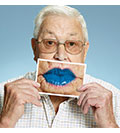
In addition to its annual support of Mouth Cancer Action Month, campaign sponsor Denplan has stepped up a gear this year by creating the Blue Lip Selfie campaign with the British Dental Health Foundation.
By encouraging the public and profession to adopt blue lips as a visible sign of support for mouth cancer, it is hoped this positive, interactive approach will significantly boost awareness of the disease.
“We’ve been inspired by other hugely effective charitable campaigns such as the ALS Ice Bucket Challenge and No Make-up Selfie and their success in raising awareness and funds for serious diseases,” said Steve Gates, Denplan’s Managing Director. “We felt that, with the significant increase in cases of mouth cancer over the last decade, it’s never been more important to get people talking about mouth cancer and encourage everyone to regularly visit their dentist. That’s why we feel passionately about creating the Blue Lip Selfie campaign with the British Dental Health Foundation.
“We chose blue lips as a visible sign of support to reflect the Mouth Cancer Action Month blue ribbon, and also because it’s striking, fun and unmissable! It’s a fresh approach to an established annual campaign and we’ve seen a huge buzz in the industry about it already.”
Organised by the British Dental Health Foundation, Mouth Cancer Action Month promotes the message ‘if in doubt, get checked out’ in a bid to save thousands of lives through early detection and is supported by hundreds of dental practices nationwide. This year the campaign is encouraging the public to be ‘Mouthaware’.
“The campaign provides an ideal platform for dental practice teams to engage with both existing patients and local residents,” said Steve. “Practices can use blue lips as a visible sign of their support for the campaign and share photos
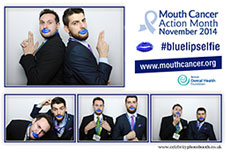
To make it easy for everyone to participate, Denplan has created a special Facebook app at www.bluelipselfie.co.uk that will launch at the end of October. Users can upload and customise selfies with fun blue cartoon lips using the app and share them on the gallery. To boost the viral potential of the campaign, Denplan is also encouraging people to share their blue lip selfies on social media using #bluelipselfie.
“To highlight the main reason behind the Blue Lip Selfie campaign, there is also an informative video on the app featuring real people who have survived mouth cancer- all because their dentist spotted signs of the disease early,” said Steve. “By sharing these moving, yet positive, stories in the words of those who have experienced mouth cancer first-hand, we hope to pass on the message that mouth cancer is very treatable when caught early, as well as raising awareness of the disease, risks and symptoms. We’re very grateful to all the contributors who shared their stories.”
The British Dental Health Foundation has set up a special Blue Lip Selfie JustGiving page for any donations or sponsorship money raised which will be specifically used for mouth cancer support groups.
Dr Nigel Carter Chief Executive of the British Dental Health Foundation commented “We are as always extremely grateful for Denplan’s ongoing support of Mouth Cancer Action Month. They have for many years been a key support for the campaign. This year they have hugely increased their support by creating the blue lip selfie app and we are hopeful that this idea will go viral greatly increasing the reach and impact of the campaign and generating significant funds to support mouth cancer sufferers.”
Article can be found at http://www.dentalhealth.org/news/details/820
Some Healthy Treats may be Harmful!
Healthy treats may not be what they claim to be.
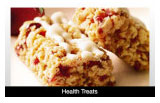
Written by Dentistry Today
Many treats that profess to be healthy options to consider instead of sweets or chocolate may, in fact, contain excessive amount of sugar or high acidity levels. Some studies even show that raisins or cereal bars and drinks like smoothies or fruit juices can be as damaging to teeth as soda.
There are cases all the time of children who end up with some type of tooth decay even though the child’s parents took measures to prevent such a thing from happening.
The problems often stem from enamel damage caused by the food or drinks that prove to be unexpectedly high in sugar or acidity.
This information shows that water may generally be the best beverage for children to drink, even instead of something like apple juice. The problems will likely be exacerbated if the child doesn’t visit the dentist on a regular basis.
The key for parents is to inspect drinks and beverages for hidden sugars or acidity levels by doing the proper research, such as reading the labels for these foods and beverages.


